人教版八年级英语下册Unit 1-2 知识点自测(含答案)
文档属性
| 名称 | 人教版八年级英语下册Unit 1-2 知识点自测(含答案) | 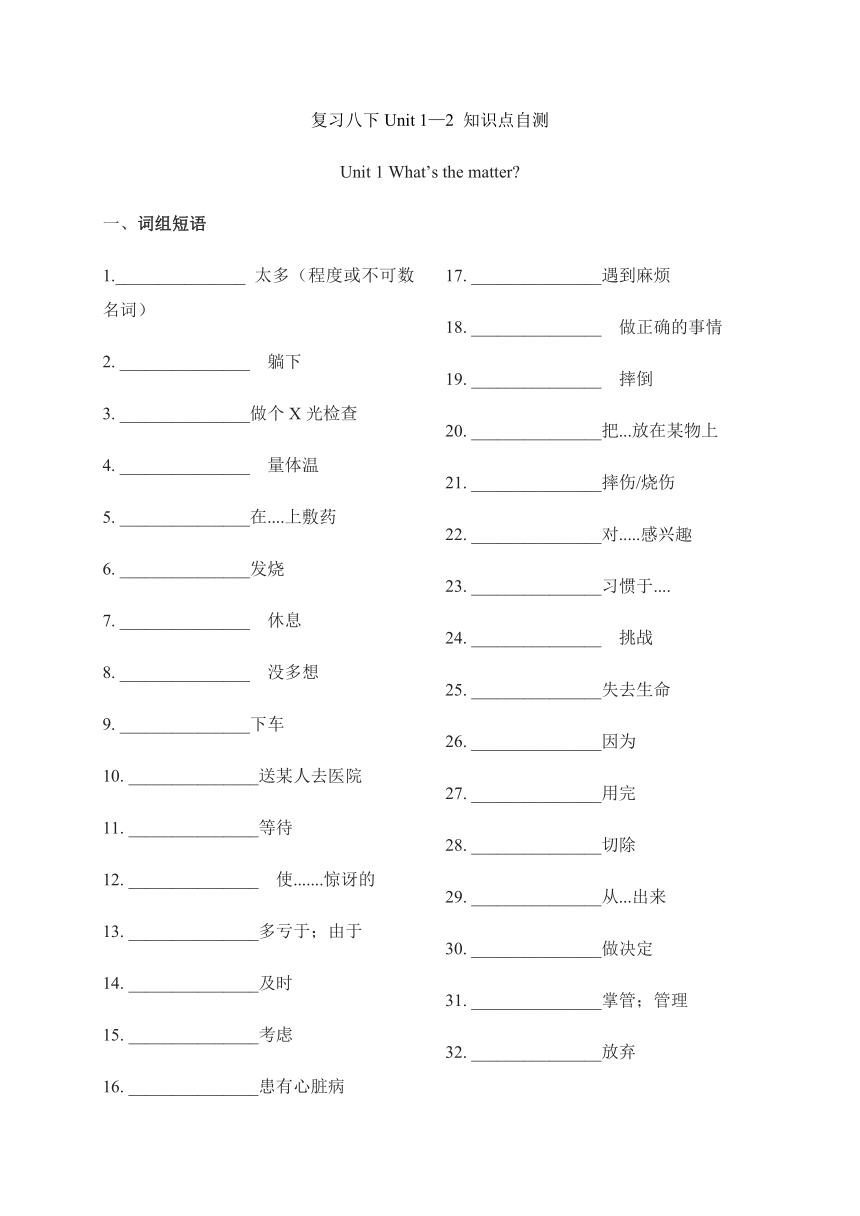 | |
| 格式 | docx | ||
| 文件大小 | 153.1KB | ||
| 资源类型 | 教案 | ||
| 版本资源 | 人教新目标(Go for it)版 | ||
| 科目 | 英语 | ||
| 更新时间 | 2023-07-27 07:13:30 | ||
图片预览

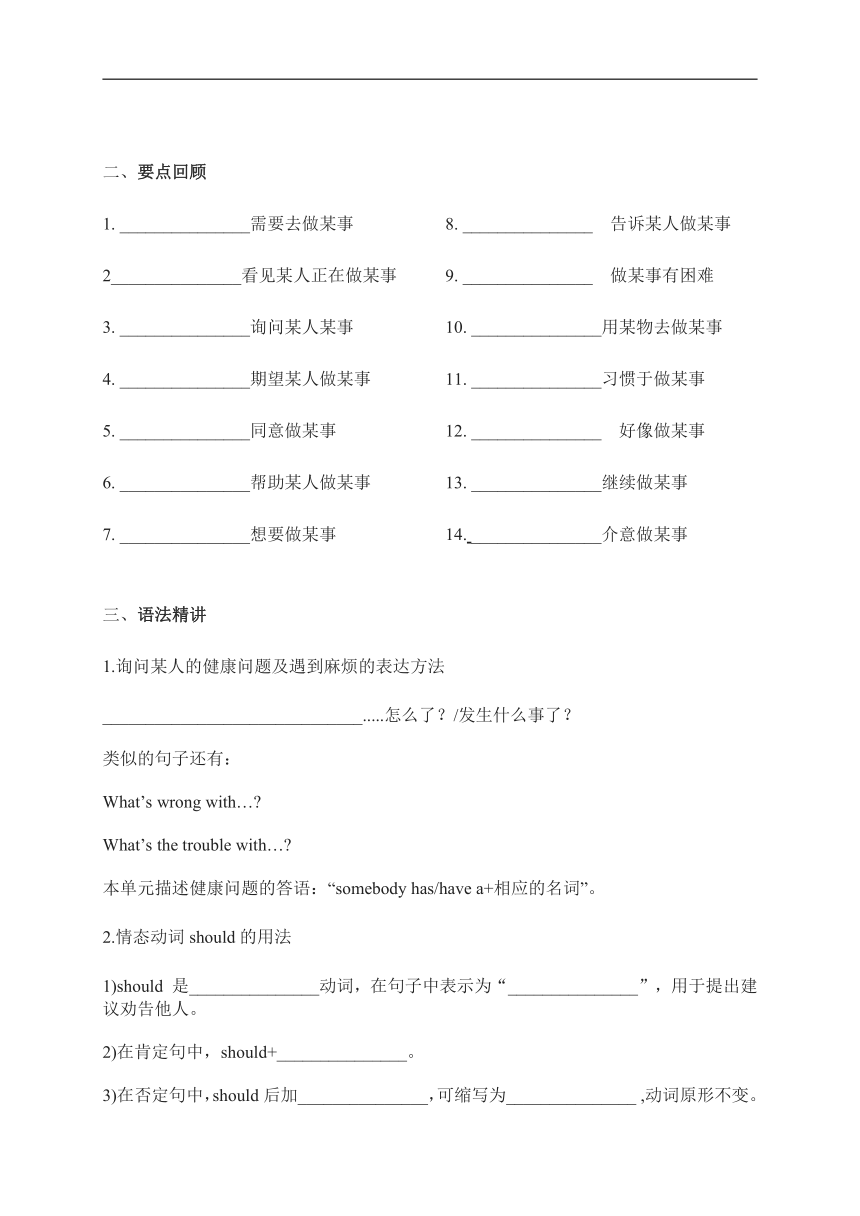
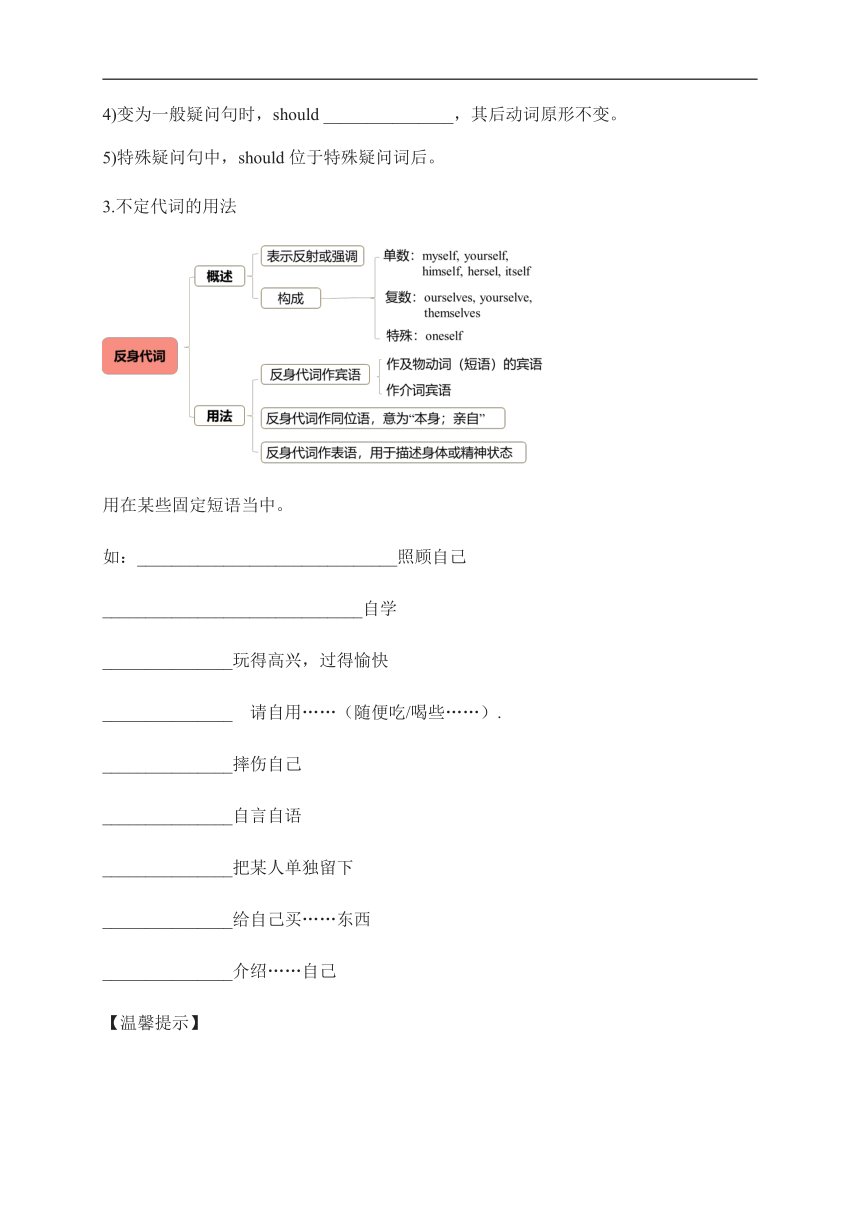
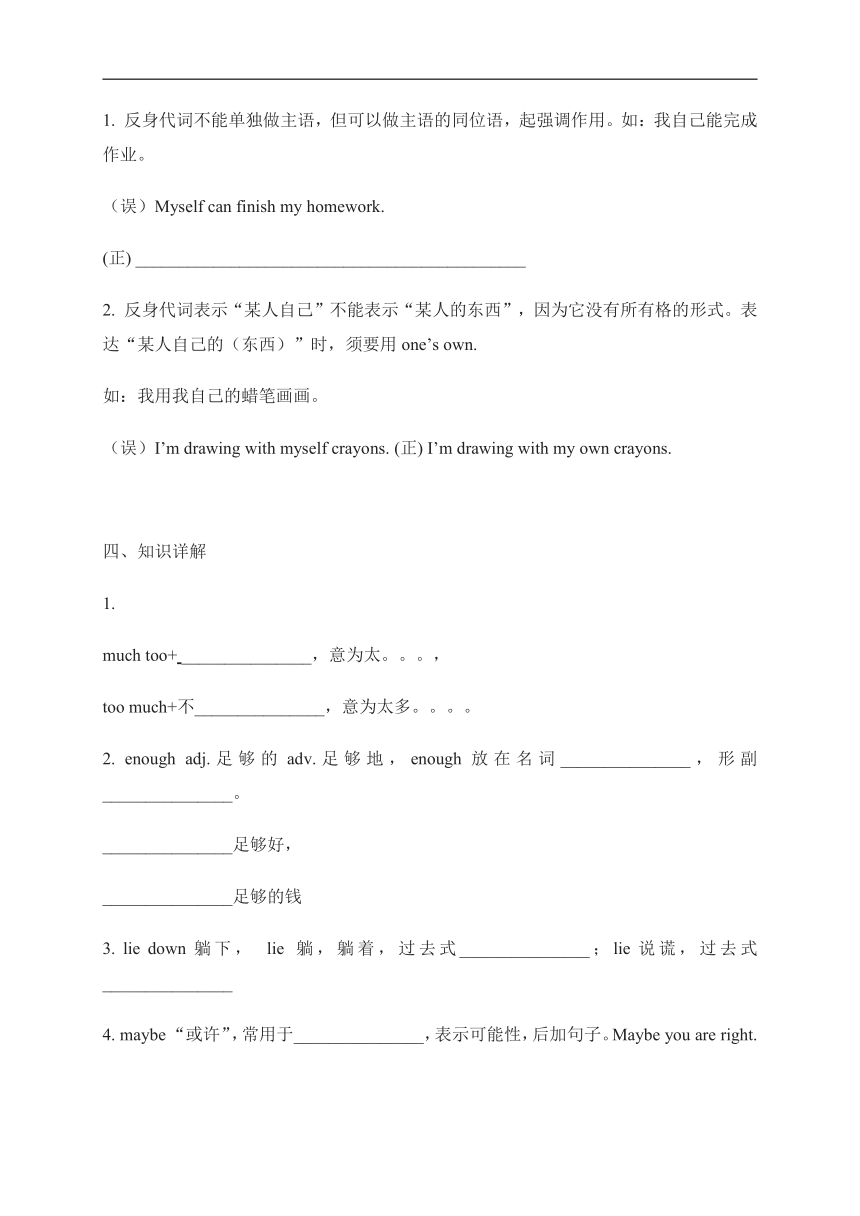
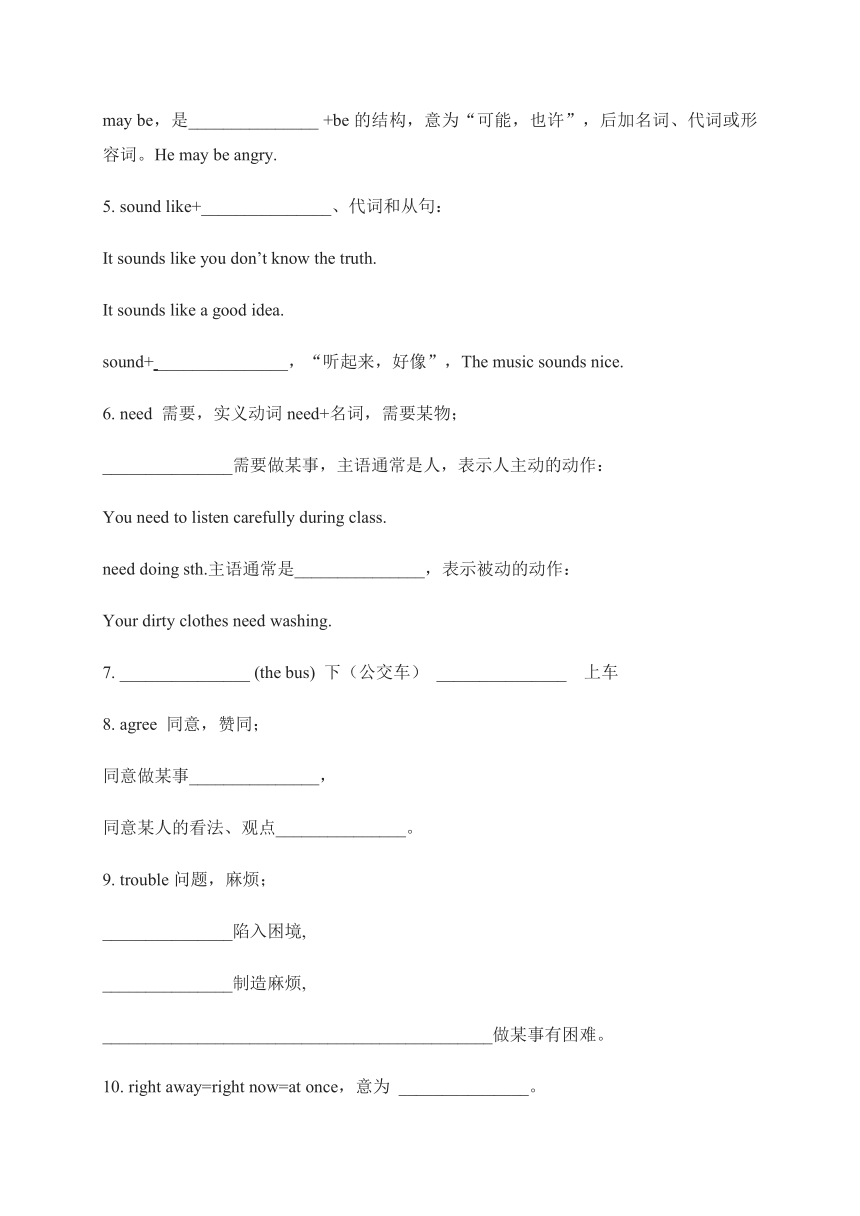
文档简介
复习八下Unit 1—2 知识点自测
Unit 1 What’s the matter
一、词组短语
1._______________ 太多(程度或不可数名词)
2. _______________ 躺下
3. _______________做个X光检查
4. _______________ 量体温
5. _______________在....上敷药
6. _______________发烧
7. _______________ 休息
8. _______________ 没多想
9. _______________下车
10. _______________送某人去医院
11. _______________等待
12. _______________ 使.......惊讶的
13. _______________多亏于;由于
14. _______________及时
15. _______________考虑
16. _______________患有心脏病
17. _______________遇到麻烦
18. _______________ 做正确的事情
19. _______________ 摔倒
20. _______________把...放在某物上
21. _______________摔伤/烧伤
22. _______________对.....感兴趣
23. _______________习惯于....
24. _______________ 挑战
25. _______________失去生命
26. _______________因为
27. _______________用完
28. _______________切除
29. _______________从...出来
30. _______________做决定
31. _______________掌管;管理
32. _______________放弃
二、要点回顾
1. _______________需要去做某事
2_______________看见某人正在做某事
3. _______________询问某人某事
4. _______________期望某人做某事
5. _______________同意做某事
6. _______________帮助某人做某事
7. _______________想要做某事
8. _______________ 告诉某人做某事
9. _______________ 做某事有困难
10. _______________用某物去做某事
11. _______________习惯于做某事
12. _______________ 好像做某事
13. _______________继续做某事
14. _______________介意做某事
三、语法精讲
1.询问某人的健康问题及遇到麻烦的表达方法
______________________________.....怎么了?/发生什么事了?
类似的句子还有:
What’s wrong with…
What’s the trouble with…
本单元描述健康问题的答语:“somebody has/have a+相应的名词”。
2.情态动词should的用法
1)should 是_______________动词,在句子中表示为“_______________”,用于提出建议劝告他人。
2)在肯定句中,should+_______________。
3)在否定句中,should后加_______________,可缩写为_______________ ,动词原形不变。
4)变为一般疑问句时,should _______________,其后动词原形不变。
5)特殊疑问句中,should位于特殊疑问词后。
3.不定代词的用法
用在某些固定短语当中。
如:______________________________照顾自己
______________________________自学
_______________玩得高兴,过得愉快
_______________ 请自用……(随便吃/喝些……).
_______________摔伤自己
_______________自言自语
_______________把某人单独留下
_______________给自己买……东西
_______________介绍……自己
【温馨提示】
1. 反身代词不能单独做主语,但可以做主语的同位语,起强调作用。如:我自己能完成作业。
(误)Myself can finish my homework.
(正) _____________________________________________
2. 反身代词表示“某人自己”不能表示“某人的东西”,因为它没有所有格的形式。表达“某人自己的(东西)”时,须要用one’s own.
如:我用我自己的蜡笔画画。
(误)I’m drawing with myself crayons. (正) I’m drawing with my own crayons.
四、知识详解
1.
much too+ _______________,意为太。。。,
too much+不_______________,意为太多。。。。
2. enough adj.足够的adv.足够地,enough放在名词_______________,形副_______________。
_______________足够好,
_______________足够的钱
3. lie down躺下, lie 躺,躺着,过去式_______________;lie说谎,过去式_______________
4. maybe “或许”,常用于_______________,表示可能性,后加句子。Maybe you are right.
may be,是_______________ +be的结构,意为“可能,也许”,后加名词、代词或形容词。He may be angry.
5. sound like+_______________、代词和从句:
It sounds like you don’t know the truth.
It sounds like a good idea.
sound+ _______________,“听起来,好像”,The music sounds nice.
6. need 需要,实义动词need+名词,需要某物;
_______________需要做某事,主语通常是人,表示人主动的动作:
You need to listen carefully during class.
need doing sth.主语通常是_______________,表示被动的动作:
Your dirty clothes need washing.
7. _______________ (the bus) 下(公交车) _______________ 上车
8. agree 同意,赞同;
同意做某事_______________,
同意某人的看法、观点_______________。
9. trouble问题,麻烦;
_______________陷入困境,
_______________制造麻烦,
_____________________________________________做某事有困难。
10. right away=right now=at once,意为 _______________。
11. run out用完,用尽
When his water run out, he knew that he would have to do something to save his own life.
物_______________某物用尽了。
人_______________人用尽了某物。
He run out of all his money last night.
12. risk (sb.) to do sth. 冒险去做某事
take a risk= _______________ 冒险
13. _______________(做)某事的重要性
We students should know the importance of (learning) English.
importance n. 重要(性),
_______________ adj.重要的,
_______________不重要的
Unit 2 I’ll help to clean the city parks
一、词组短语
1. _______________打扫干净
2. ____________(使)变得更高兴;振奋起来
3. _______________ 分发
4. _______________ 曾经......;过去........
5. _______________ 赠送;捐赠
6. _______________建立;设立
7. _______________有作为
8. _______________想出
9. _______________推迟
10. _______________张贴
11. _______________打电话给
12. _______________帮助.....摆脱困难
13. _______________照顾;照看
14. _______________放弃
15. _______________参加选拔
16. _______________实现
17. _______________用光
18. _______________与.....相像
19. _______________修理
20. _______________与......相似
二、要点回顾
1. _______________ 需要做某事
2. _______________制定计划做某事
3. _______________要求某人(不要)做某事
4. _______________过去常常做某事
5. _______________决定做某事
6. _______________帮助某人做某事
7 _______________对......产生影响
8. _______________使得做某事对某人来说是可能的
三、语法精讲
动词不定式归纳
只跟动词不定式做宾语的动词
决心学会有希望( _______________)
同意计划莫假装(_______________)
忘记拒绝会失望(_______________)
准备设法来帮忙(_______________)
提供请求负担起(_______________)
记得阻止理应当(_______________)
参考答案
Unit 1 What’s the matter
一、词组短语
1.too much 太多
2.liedown 躺下
3.get an X-ray 做个X光检查
4.take one’s temperature 量体温
5.put some medicine on ......在....上敷药
6.have a fever 发烧
7.take breaks/take a break 休息
8.without thinking twice 没多想
9.get off 下车
10.take sb to the hospital 送某人去医院
11.wait for等待
12.to one’s surprise 使.......惊讶的
13.thanks to多亏于;由于
14.in time及时
15.think about 考虑
16.havea heart problem患有心脏病
17.get into the trouble 遇到麻烦
18.do the right thing 做正确的事情
19.fall down 摔倒
20.put ...... on sth把...放在某物上
21.get hit/sunburned 摔伤/烧伤
22.be interested in 对.....感兴趣
23.be used to 习惯于....
24.take risks/take a risk 挑战
25.lose one’s life 失去生命
26.because of 因为
27.run out of 用完
28.cut off 切除
29.get out of 从...出来
30.make a decision/decisions 做决定
31.be in control of 掌管;管理
32.give up 放弃
二、要点回顾
1.need to do sth .需要去做某事
2.see sb doing sth 看见某人正在做某事
3.ask sb sth 询问某人某事
4.expect sb to do sth 期望某人做某事
5.agree to do sth 同意做某事
6.help sb (to) do sth 帮助某人做某事
7.want to do sth 想要做某事
8.tell sb to do sth 告诉某人做某事
9.have problems(in) doing sth 做某事有困难
10.use sth to do sth用某物去做某事
11.be/get used to doing sth 习惯于做某事
12.seem to do sth 好像做某事
13.keep on doing sth 继续做某事
14.mind doing sth 介意做某事
三、语法精讲
1.询问某人的健康问题及遇到麻烦的表达方法
What’s the matter with… ......怎么了?/发生什么事了?
类似的句子还有:
What’s wrong with…
What’s the trouble with…
本单元描述健康问题的答语:“somebody has/have a+相应的名词”。
2.情态动词should的用法
1)should 是情态动词,在句子中表示为“应该”,用于提出建议劝告他人。
2)在肯定句中,should+动词原形。
3)在否定句中,should后加not ,可缩写为shouldn’t ,动词原形不变。
4)变为一般疑问句时,should 提到句首,其后动词原形不变。
5)特殊疑问句中,should位于特殊疑问词后。
3.不定代词的用法
用在某些固定短语当中。
如:look after oneself / take care of oneself 照顾自己
teach oneself sth./ learn sth. by oneself自学
enjoy oneself 玩得高兴,过得愉快
help oneself to sth 请自用……(随便吃/喝些……).
hurt oneself摔伤自己
say to oneself自言自语
leave sb. by oneself把某人单独留下
buy oneself sth.给自己买……东西
introduce oneself 介绍……自己
【温馨提示】
1. 反身代词不能单独做主语,但可以做主语的同位语,起强调作用。如:我自己能完成作业。
(误)Myself can finish my homework. (正) I myself can finish my homework. / I can finish my homework myself.
2. 反身代词表示“某人自己”不能表示“某人的东西”,因为它没有所有格的形式。表达“某人自己的(东西)”时,须要用one’s own.
如:我用我自己的蜡笔画画。(误)I’m drawing with myself crayons. (正) I’m drawing with my own crayons.
四、知识详解
1.
much too+形容词或副词,意为太。。。,
too much+不可数名词,意为太多。。。。
2. enough adj.足够的adv.足够地,enough放在名词后,形副后。
good enough足够好,
enough money足够的钱
3. lie down躺下, lie 躺,躺着,过去式lay;lie说谎,过去式lied
4. maybe “或许”,常用于句首,表示可能性,后加句子。Maybe you are right.
may be,是情态动词+be的结构,意为“可能,也许”,后加名词、代词或形容词。He may be angry.
5. sound like+名词代词和从句:
It sounds like you don’t know the truth.
It sounds like a good idea.
sound+形容词,“听起来,好像”,The music sounds nice.
6. need 需要,实义动词need+名词,需要某物;
need to do sth.需要做某事,主语通常是人,表示人主动的动作:
You need to listen carefully during class.
need doing sth.主语通常是物,表示被动的动作:
Your dirty clothes need washing.
7. get off (the bus) 下(公交车) get on 上车
8. agree 同意,赞同;
同意做某事agree to do ,
同意某人的看法、观点agree with sb。
9. trouble问题,麻烦;
be in trouble 陷入困境,
make trouble 制造麻烦,
have trouble(in) doing sth. =have difficulties (in) doing sth 做某事有困难。
10. right away=right now=at once,意为 立刻,马上 。
11. run out用完,用尽
When his water run out, he knew that he would have to do something to save his own life.
物sth. run out. 某物用尽了。
人sb. run out of sth..人用尽了某物。
He run out of all his money last night.
12. risk (sb.) to do sth. 冒险去做某事
take a risk=take risks 冒险
13. the importance of (doing) sth.(做)某事的重要性
We students should know the importance of (learning) English.
importance n. 重要(性),
important adj.重要的,
unimportant adj.不重要的
Unit 2 I’ll help to clean the city parks
一、词组短语
1.clean up 打扫干净
2.cheer up (使)变得更高兴;振奋起来
3.give out 分发
4.used to 曾经......;过去........
5.give away 赠送;捐赠
6.set up 建立;设立
7.make a difference有作为
8.come up with 想出
9.put off 推迟
10.put up 张贴
11.call up 打电话给
12.help out 帮助.....摆脱困难
13.care for 照顾;照看
14.giveup 放弃
15.try out for 参加选拔
e true 实现
17.run out of 用光
18.take after 与.....相像
19.fix up 修理
20.be similar to 与......相似
二、要点回顾
1.need to do sth 需要做某事
2.make plan to do sth 制定计划做某事
3.ask sb (not ) to do sth 要求某人(不要)做某事
4.used to dosth 过去常常做某事
5.decide to do sth 决定做某事
6.help sb(to)do sth 帮助某人做某事
7.makea difference to 对......产生影响
8.make it possible for sb to do sth 使得做某事对某人来说是可能的
三、语法精讲
动词不定式归纳
只跟动词不定式做宾语的动词
决心学会有希望( decide,learn,wish,hope)
同意计划莫假装(agree,plan,pretend)
忘记拒绝会失望(forget,refuse,fail)
准备设法来帮忙(prepare,try,manage,help)
提供请求负担起(offer,beg,afford)
记得阻止理应当(remember stop,be supposed)
Unit 1 What’s the matter
一、词组短语
1._______________ 太多(程度或不可数名词)
2. _______________ 躺下
3. _______________做个X光检查
4. _______________ 量体温
5. _______________在....上敷药
6. _______________发烧
7. _______________ 休息
8. _______________ 没多想
9. _______________下车
10. _______________送某人去医院
11. _______________等待
12. _______________ 使.......惊讶的
13. _______________多亏于;由于
14. _______________及时
15. _______________考虑
16. _______________患有心脏病
17. _______________遇到麻烦
18. _______________ 做正确的事情
19. _______________ 摔倒
20. _______________把...放在某物上
21. _______________摔伤/烧伤
22. _______________对.....感兴趣
23. _______________习惯于....
24. _______________ 挑战
25. _______________失去生命
26. _______________因为
27. _______________用完
28. _______________切除
29. _______________从...出来
30. _______________做决定
31. _______________掌管;管理
32. _______________放弃
二、要点回顾
1. _______________需要去做某事
2_______________看见某人正在做某事
3. _______________询问某人某事
4. _______________期望某人做某事
5. _______________同意做某事
6. _______________帮助某人做某事
7. _______________想要做某事
8. _______________ 告诉某人做某事
9. _______________ 做某事有困难
10. _______________用某物去做某事
11. _______________习惯于做某事
12. _______________ 好像做某事
13. _______________继续做某事
14. _______________介意做某事
三、语法精讲
1.询问某人的健康问题及遇到麻烦的表达方法
______________________________.....怎么了?/发生什么事了?
类似的句子还有:
What’s wrong with…
What’s the trouble with…
本单元描述健康问题的答语:“somebody has/have a+相应的名词”。
2.情态动词should的用法
1)should 是_______________动词,在句子中表示为“_______________”,用于提出建议劝告他人。
2)在肯定句中,should+_______________。
3)在否定句中,should后加_______________,可缩写为_______________ ,动词原形不变。
4)变为一般疑问句时,should _______________,其后动词原形不变。
5)特殊疑问句中,should位于特殊疑问词后。
3.不定代词的用法
用在某些固定短语当中。
如:______________________________照顾自己
______________________________自学
_______________玩得高兴,过得愉快
_______________ 请自用……(随便吃/喝些……).
_______________摔伤自己
_______________自言自语
_______________把某人单独留下
_______________给自己买……东西
_______________介绍……自己
【温馨提示】
1. 反身代词不能单独做主语,但可以做主语的同位语,起强调作用。如:我自己能完成作业。
(误)Myself can finish my homework.
(正) _____________________________________________
2. 反身代词表示“某人自己”不能表示“某人的东西”,因为它没有所有格的形式。表达“某人自己的(东西)”时,须要用one’s own.
如:我用我自己的蜡笔画画。
(误)I’m drawing with myself crayons. (正) I’m drawing with my own crayons.
四、知识详解
1.
much too+ _______________,意为太。。。,
too much+不_______________,意为太多。。。。
2. enough adj.足够的adv.足够地,enough放在名词_______________,形副_______________。
_______________足够好,
_______________足够的钱
3. lie down躺下, lie 躺,躺着,过去式_______________;lie说谎,过去式_______________
4. maybe “或许”,常用于_______________,表示可能性,后加句子。Maybe you are right.
may be,是_______________ +be的结构,意为“可能,也许”,后加名词、代词或形容词。He may be angry.
5. sound like+_______________、代词和从句:
It sounds like you don’t know the truth.
It sounds like a good idea.
sound+ _______________,“听起来,好像”,The music sounds nice.
6. need 需要,实义动词need+名词,需要某物;
_______________需要做某事,主语通常是人,表示人主动的动作:
You need to listen carefully during class.
need doing sth.主语通常是_______________,表示被动的动作:
Your dirty clothes need washing.
7. _______________ (the bus) 下(公交车) _______________ 上车
8. agree 同意,赞同;
同意做某事_______________,
同意某人的看法、观点_______________。
9. trouble问题,麻烦;
_______________陷入困境,
_______________制造麻烦,
_____________________________________________做某事有困难。
10. right away=right now=at once,意为 _______________。
11. run out用完,用尽
When his water run out, he knew that he would have to do something to save his own life.
物_______________某物用尽了。
人_______________人用尽了某物。
He run out of all his money last night.
12. risk (sb.) to do sth. 冒险去做某事
take a risk= _______________ 冒险
13. _______________(做)某事的重要性
We students should know the importance of (learning) English.
importance n. 重要(性),
_______________ adj.重要的,
_______________不重要的
Unit 2 I’ll help to clean the city parks
一、词组短语
1. _______________打扫干净
2. ____________(使)变得更高兴;振奋起来
3. _______________ 分发
4. _______________ 曾经......;过去........
5. _______________ 赠送;捐赠
6. _______________建立;设立
7. _______________有作为
8. _______________想出
9. _______________推迟
10. _______________张贴
11. _______________打电话给
12. _______________帮助.....摆脱困难
13. _______________照顾;照看
14. _______________放弃
15. _______________参加选拔
16. _______________实现
17. _______________用光
18. _______________与.....相像
19. _______________修理
20. _______________与......相似
二、要点回顾
1. _______________ 需要做某事
2. _______________制定计划做某事
3. _______________要求某人(不要)做某事
4. _______________过去常常做某事
5. _______________决定做某事
6. _______________帮助某人做某事
7 _______________对......产生影响
8. _______________使得做某事对某人来说是可能的
三、语法精讲
动词不定式归纳
只跟动词不定式做宾语的动词
决心学会有希望( _______________)
同意计划莫假装(_______________)
忘记拒绝会失望(_______________)
准备设法来帮忙(_______________)
提供请求负担起(_______________)
记得阻止理应当(_______________)
参考答案
Unit 1 What’s the matter
一、词组短语
1.too much 太多
2.liedown 躺下
3.get an X-ray 做个X光检查
4.take one’s temperature 量体温
5.put some medicine on ......在....上敷药
6.have a fever 发烧
7.take breaks/take a break 休息
8.without thinking twice 没多想
9.get off 下车
10.take sb to the hospital 送某人去医院
11.wait for等待
12.to one’s surprise 使.......惊讶的
13.thanks to多亏于;由于
14.in time及时
15.think about 考虑
16.havea heart problem患有心脏病
17.get into the trouble 遇到麻烦
18.do the right thing 做正确的事情
19.fall down 摔倒
20.put ...... on sth把...放在某物上
21.get hit/sunburned 摔伤/烧伤
22.be interested in 对.....感兴趣
23.be used to 习惯于....
24.take risks/take a risk 挑战
25.lose one’s life 失去生命
26.because of 因为
27.run out of 用完
28.cut off 切除
29.get out of 从...出来
30.make a decision/decisions 做决定
31.be in control of 掌管;管理
32.give up 放弃
二、要点回顾
1.need to do sth .需要去做某事
2.see sb doing sth 看见某人正在做某事
3.ask sb sth 询问某人某事
4.expect sb to do sth 期望某人做某事
5.agree to do sth 同意做某事
6.help sb (to) do sth 帮助某人做某事
7.want to do sth 想要做某事
8.tell sb to do sth 告诉某人做某事
9.have problems(in) doing sth 做某事有困难
10.use sth to do sth用某物去做某事
11.be/get used to doing sth 习惯于做某事
12.seem to do sth 好像做某事
13.keep on doing sth 继续做某事
14.mind doing sth 介意做某事
三、语法精讲
1.询问某人的健康问题及遇到麻烦的表达方法
What’s the matter with… ......怎么了?/发生什么事了?
类似的句子还有:
What’s wrong with…
What’s the trouble with…
本单元描述健康问题的答语:“somebody has/have a+相应的名词”。
2.情态动词should的用法
1)should 是情态动词,在句子中表示为“应该”,用于提出建议劝告他人。
2)在肯定句中,should+动词原形。
3)在否定句中,should后加not ,可缩写为shouldn’t ,动词原形不变。
4)变为一般疑问句时,should 提到句首,其后动词原形不变。
5)特殊疑问句中,should位于特殊疑问词后。
3.不定代词的用法
用在某些固定短语当中。
如:look after oneself / take care of oneself 照顾自己
teach oneself sth./ learn sth. by oneself自学
enjoy oneself 玩得高兴,过得愉快
help oneself to sth 请自用……(随便吃/喝些……).
hurt oneself摔伤自己
say to oneself自言自语
leave sb. by oneself把某人单独留下
buy oneself sth.给自己买……东西
introduce oneself 介绍……自己
【温馨提示】
1. 反身代词不能单独做主语,但可以做主语的同位语,起强调作用。如:我自己能完成作业。
(误)Myself can finish my homework. (正) I myself can finish my homework. / I can finish my homework myself.
2. 反身代词表示“某人自己”不能表示“某人的东西”,因为它没有所有格的形式。表达“某人自己的(东西)”时,须要用one’s own.
如:我用我自己的蜡笔画画。(误)I’m drawing with myself crayons. (正) I’m drawing with my own crayons.
四、知识详解
1.
much too+形容词或副词,意为太。。。,
too much+不可数名词,意为太多。。。。
2. enough adj.足够的adv.足够地,enough放在名词后,形副后。
good enough足够好,
enough money足够的钱
3. lie down躺下, lie 躺,躺着,过去式lay;lie说谎,过去式lied
4. maybe “或许”,常用于句首,表示可能性,后加句子。Maybe you are right.
may be,是情态动词+be的结构,意为“可能,也许”,后加名词、代词或形容词。He may be angry.
5. sound like+名词代词和从句:
It sounds like you don’t know the truth.
It sounds like a good idea.
sound+形容词,“听起来,好像”,The music sounds nice.
6. need 需要,实义动词need+名词,需要某物;
need to do sth.需要做某事,主语通常是人,表示人主动的动作:
You need to listen carefully during class.
need doing sth.主语通常是物,表示被动的动作:
Your dirty clothes need washing.
7. get off (the bus) 下(公交车) get on 上车
8. agree 同意,赞同;
同意做某事agree to do ,
同意某人的看法、观点agree with sb。
9. trouble问题,麻烦;
be in trouble 陷入困境,
make trouble 制造麻烦,
have trouble(in) doing sth. =have difficulties (in) doing sth 做某事有困难。
10. right away=right now=at once,意为 立刻,马上 。
11. run out用完,用尽
When his water run out, he knew that he would have to do something to save his own life.
物sth. run out. 某物用尽了。
人sb. run out of sth..人用尽了某物。
He run out of all his money last night.
12. risk (sb.) to do sth. 冒险去做某事
take a risk=take risks 冒险
13. the importance of (doing) sth.(做)某事的重要性
We students should know the importance of (learning) English.
importance n. 重要(性),
important adj.重要的,
unimportant adj.不重要的
Unit 2 I’ll help to clean the city parks
一、词组短语
1.clean up 打扫干净
2.cheer up (使)变得更高兴;振奋起来
3.give out 分发
4.used to 曾经......;过去........
5.give away 赠送;捐赠
6.set up 建立;设立
7.make a difference有作为
8.come up with 想出
9.put off 推迟
10.put up 张贴
11.call up 打电话给
12.help out 帮助.....摆脱困难
13.care for 照顾;照看
14.giveup 放弃
15.try out for 参加选拔
e true 实现
17.run out of 用光
18.take after 与.....相像
19.fix up 修理
20.be similar to 与......相似
二、要点回顾
1.need to do sth 需要做某事
2.make plan to do sth 制定计划做某事
3.ask sb (not ) to do sth 要求某人(不要)做某事
4.used to dosth 过去常常做某事
5.decide to do sth 决定做某事
6.help sb(to)do sth 帮助某人做某事
7.makea difference to 对......产生影响
8.make it possible for sb to do sth 使得做某事对某人来说是可能的
三、语法精讲
动词不定式归纳
只跟动词不定式做宾语的动词
决心学会有希望( decide,learn,wish,hope)
同意计划莫假装(agree,plan,pretend)
忘记拒绝会失望(forget,refuse,fail)
准备设法来帮忙(prepare,try,manage,help)
提供请求负担起(offer,beg,afford)
记得阻止理应当(remember stop,be supposed)
同课章节目录
- Unit 1 What's the matter?
- Section A
- Section B
- Unit 2 I'll help to clean up the city parks.
- Section A
- Section B
- Unit 3 Could you please clean your room?
- Section A
- Section B
- Unit 4 Why don't you talk to your parents?
- Section A
- Section B
- Unit 5 What were you doing when the rainstorm came
- Section A
- Section B
- Review of Units 1-5
- Unit 6 An old man tried to move the mountains.
- Section A
- Section B
- Unit 7 What's the highest mountain in the world?
- Section A
- Section B
- Unit 8 Have you read Treasure Island yet?
- Section A
- Section B
- Unit 9 Have you ever been to a museum?
- Section A
- Section B
- Unit 10 I've had this bike for three years.
- Section A
- Section B
